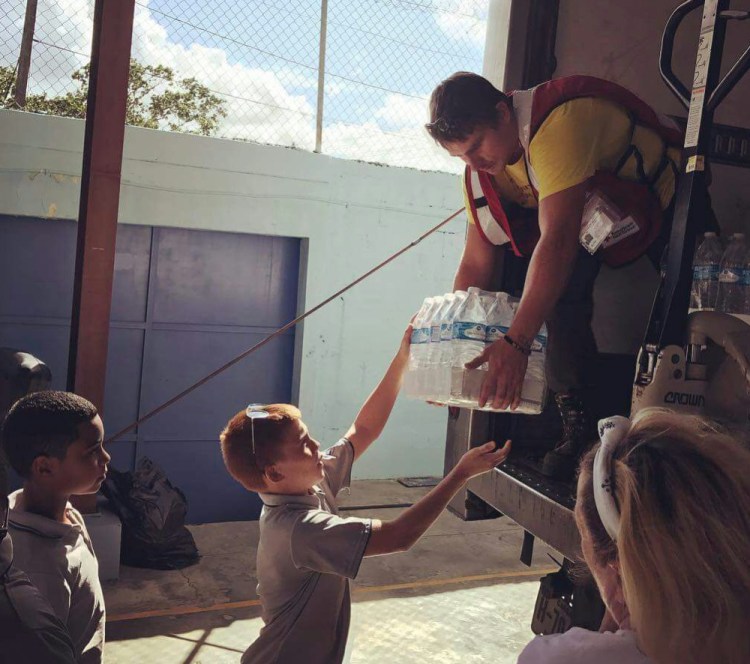Dylan Gordon was looking for a change in career and location last fall when the western Maine native saw a chance to do both while helping others.
After a crash-course training program, Gordon headed for Louisiana in October to help with the Red Cross disaster response to Hurricane Nate, then was sent on to Houston after Hurricane Harvey. Nearly three months later, the 20-year-old is still “deployed” as a Red Cross volunteer, helping residents of Puerto Rico recover from Hurricane Maria.
“I enjoy what I do every day and that, to me, is worth more than money,” Gordon said in a phone interview from San Juan.
Justine Fraser, meanwhile, is wrapping up a three-week stint in San Juan helping people who lost loved ones during or after the storm.
“It’s healing work,” said Fraser, a licensed social worker from South Portland. “They are still suffering, but we are working on healing together.”
Maine’s Red Cross program helped arrange 140 deployments – largely of volunteers – from the state in 2017 to assist in the aftermath of hurricanes, wildfires and other disasters. While the scale of the American Red Cross’ disaster response and recovery effort is much smaller today than it was a few months ago, volunteers from Maine and across the country continue to work in hard-hit areas such as Puerto Rico.
Most years, Maine’s Red Cross program tends to send experienced volunteers or staffers to assist with specific tasks – such as logistics or direct care – in areas hit by a disaster.

Justine Fraser, a South Portland social worker, helped counsel people in Puerto Rico who lost loved ones in Hurricane Maria. Photo courtesy of Red Cross
“This year was a little different in that there were so many large-scale disasters happening simultaneously that we started holding rapid deployment training for volunteers … to deploy them as soon as possible,” said Dave Sheehan, regional disaster program officer for the Red Cross in Maine. “That is a lot of people for us. Here in the Northeast, we provided a lot of people around the country to respond to these disasters.”
While last fall’s hurricanes have largely slipped from the daily headlines, Sheehan said there is still plenty of work to be done, particularly in Puerto Rico. When it made landfall Sept. 20, Hurricane Maria destroyed the island’s power grid, demolished countless homes and crippled the road infrastructure.
Gordon arrived in Puerto Rico on Nov. 11 and has spent much of his time helping to distribute food, water and other supplies around the island. More than seven weeks later, debris is still scattered everywhere, but the roads are clearer and more of the island is regaining electricity, said Gordon, who is based in San Juan.
“We are constantly finding new people,” said Gordon, who lived in West Paris and worked as a carpenter before volunteering with the Red Cross. “This island isn’t that big but there are a lot of people who still need help.”
Fraser, the South Portland social worker, is a member of a “condolence care team” that helps people who lost loved ones during the hurricane or in its aftermath. Working with local funeral homes, the four-person team offers immediate counseling, health care and spiritual assistance to individuals or families struggling with a recent death.
Like Gordon, Fraser had not deployed as a volunteer before this year. But Fraser, who is a mental health counselor for Pathways of Maine in Scarborough, said the experience in Puerto Rico has been challenging yet rewarding.
“I saw what was going on down here and I thought, ‘Oh my God, I wish I could do more,’ ” said Fraser, who was given time off from her job to go to Puerto Rico. “People are so grateful and kind. I feel fortunate to be here.”
Sheehan, the Red Cross officer, also deployed twice in the fall, first to Georgia after Hurricane Irma and then to Puerto Rico. While the initial disaster work primarily focused on meeting local residents’ immediate needs – especially clean water and food – the work is now transitioning more to the “recovery” phase.
As an example, Sheehan said he was involved with distributing durable, gravity-fed water filtration systems so that island residents could spend more time beginning to rebuild their homes or returning to work rather than waiting hours for water deliveries.
“We are always looking for more people, but at this point we are not running those rapid-deployment boot camps,” Sheehan said.
Throughout the busy deployment season, the Maine Red Cross continued to offer assistance after local disasters, such as when fire destroys a family’s home.
For his part, Gordon said he was enjoying his newfound status as a long-term volunteer in Puerto Rico. He joked that the work comes with a six-figure salary, but “sadly, they are all zeros.”
“These people are amazing,” he said of inhabitants of the U.S. territory. “Their culture is beautiful, and they put such value on family.”
Send questions/comments to the editors.



